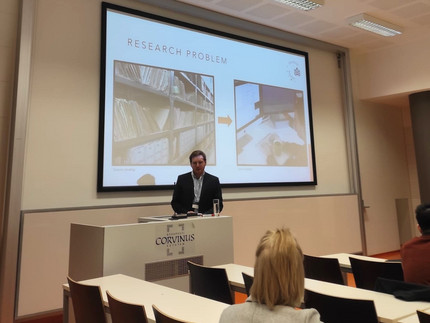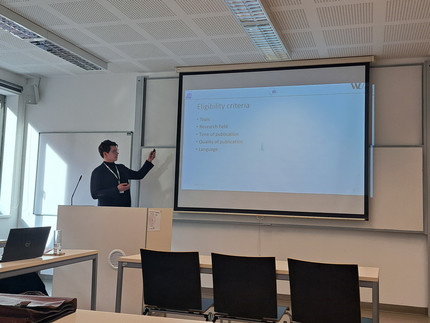Nicolas Drathschmidt und Jakob Kühler präsentieren Forschungsergebnisse auf der IRSPM-Konferenz 2023
Die beiden akademischen Mitarbeiter haben ihre aktuellen Artikel zu den Themen „Digital Red Tape“ und „Digital Transformation in Local Governments“ auf der IRSPM-Konferenz 2023 in Budapest vorgestellt und diskutiert. Die Konferenz ist eine führende Veranstaltung für internationale Forschende im Bereich des öffentlichen Managements und befasst sich mit aktuellen Themen und Herausforderungen im öffentlichen Sektor.
Nicolas Drathschmidt untersuchte, wie digitale Technologien die bürokratischen Prozesse in der öffentlichen Verwaltung beeinflussen. Jakob Kühler wiederum stellte gemeinsam mit Tobias Polzer von der Wirtschaftsuniversität Wien einen Literature Review zu "Digital Transformation in Local Governments" vor, der im Rahmen des DIGILOG-Projektes entstanden ist. Beide Präsentationen regten zu interessanten Diskussionen über die mehrschichtigen Implikationen von Digitalisierung auf das Management von öffentlichen Organisationen an.
Red Tape 4.0 - Digital era, same bureaucracy?
Abstract: The impact of digital technologies on the public sector has been substantial, and the COVID-19 pandemic has accelerated this digital transformation. The promise of digitalization is to cut red tape and increase efficiency, but it is unclear whether the transfer of analog processes to the digital sphere will eliminate compliance burdens. This paper seeks to investigate how public employees perceive digital red tape and whether different forms and sources of red tape have different effects. Using an online survey experiment with German public sector employees, the study will explore the relational nature of red tape through the lens of appraisal-theory and highlight the need to improve processes alongside the introduction of digital technologies.
Digital Transformation of Local Government Services in Europe. A Structured Literature Review
Abstract: Digital transformation is expected to fundamentally reshape service delivery, internal organisation of administration and has wider governance implications. This article presents a structured literature review on digital transformation in local government in Europe in public service delivery in order to consolidate knowledge and highlight trends. 45 academic studies in English that were published between 2010 and 2022 are analysed. We (1) analyse the focal themes of digital transformation research at the local government level, (2) the influential factors and effects of digital transformation and (3) show possible avenues for future research. The results of our literature review show that regarding influencing factors, most studies look at the micro level, with preferences and competencies of personnel, new management positions and characteristics of technology as the most salient issues. On the macro level, influencing factors may be grouped into socio-economic, demographic, institutional factors and external catalysts. Regarding the effects of digital transformation, most studies in our sample either examine output factors (such as e-maturity, efficiency, effectiveness and process changes and new requirements for leadership) or, but less so, outcomes (such as service performance, responsiveness, changes in workload and transparency), whereas impacts are less studied. Still, the effects of digital transformation projects are so far only poorly understood and should be further inquired. We also identify a geographic and size bias in existing research, which should be addressed by particularly analysing the situation in Central and Eastern European countries and smaller municipalities. Furthermore, cross-countries and over-time comparative research is largely missing and needs more attention.



